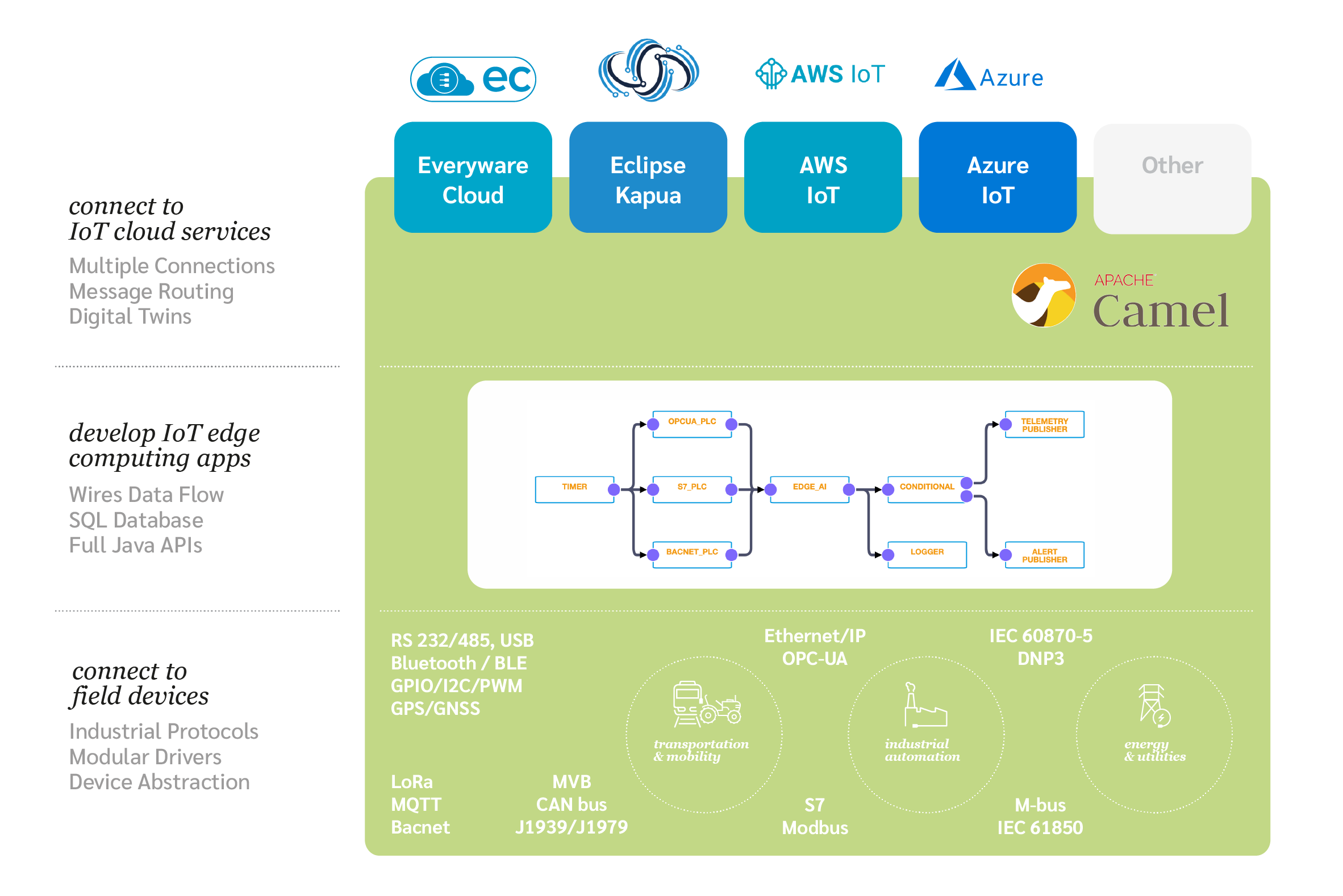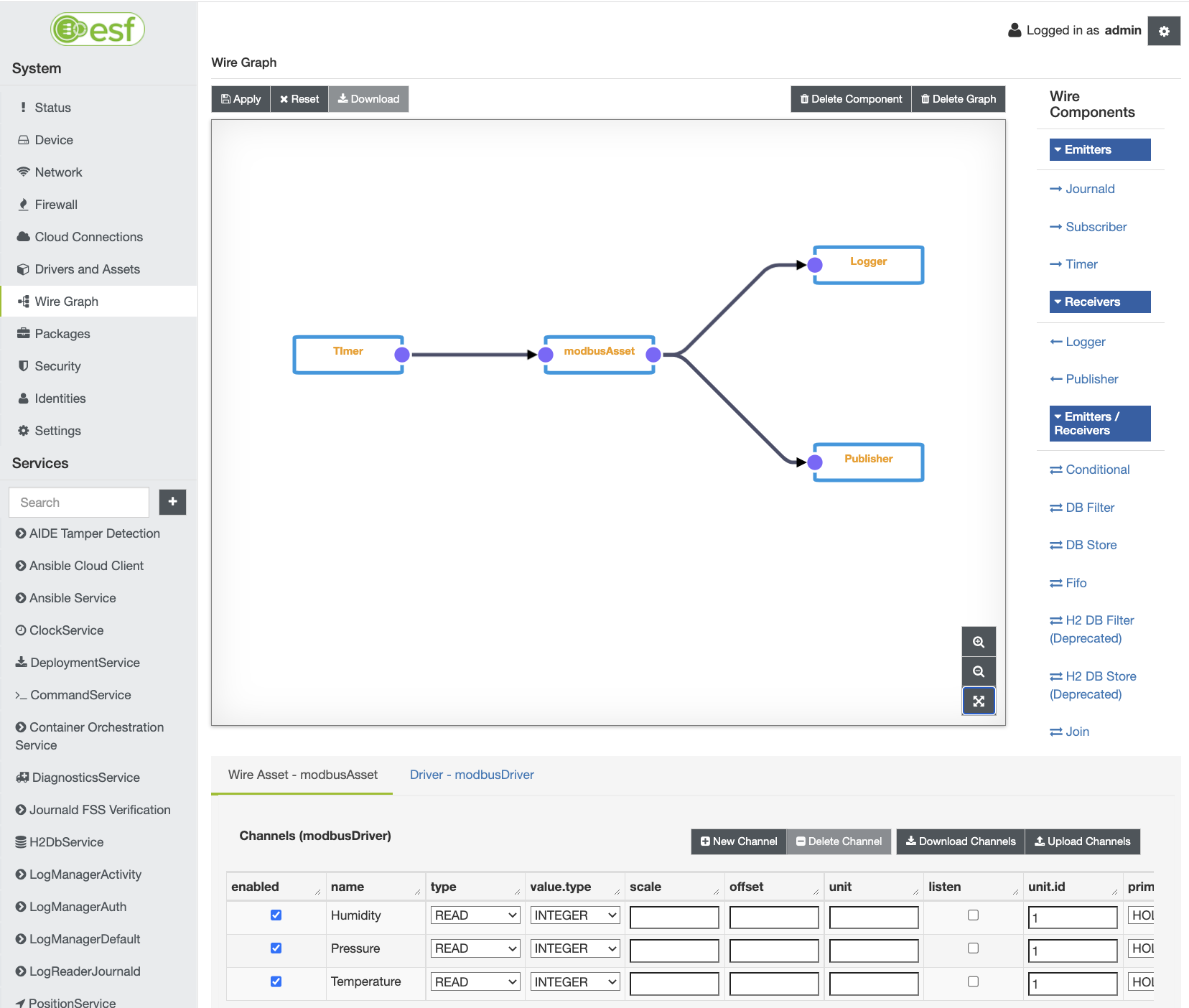IoT Edge Framework
Edge Computing enables systems to perform data processing at the edge of the network, near the source of the data. This reduces the communications bandwidth needed between sensors and the central data center by performing analytics and knowledge generation at or near the source of the data. The Internet of Things (IoT) service gateway model, running enterprise-level software stacks and operating on the edge of an IoT deployment as an aggregator and controller, provides the best foundation for Edge Computing solutions.
Eurotech’s Everyware Software Framework (ESF) is a commercial, enterprise-ready edition of Eclipse Kura, the open source Java/OSGi IoT Edge Framework for IoT gateways. Distributed and supported by Eurotech, ESF enhances Eclipse Kura with premium features around advanced security, diagnostics, provisioning, remote access and full integration with Everyware Cloud, Eurotech’s IoT Integration Platform.
The ESF IoT Edge Framework enables developers to:
- Develop and manage IoT edge computing applications
- Easily connect to IoT devices and cloud services using IoT industrial protocols
- Visually compose data flows to manage, analyse and route data
Thanks to its Java/OSGi basis, ESF and its applications can be ported across different system hardware architectures and can be dynamically updated. Moreover, as ESF is based on the leading open source technology Eclipse Kura, it prevents vendor lock-in and guarantees the protection of the software investment.

The functinalities offered by the ESF IoT Edge Framework can be divided into three main areas:
Connect to Field Devices
ESF employs a single model to simplify the communication between the devices and the gateway. It first encapsulates protocols such as Modbus and OPC-UA so that a common format can be reused across different devices then it automatically creates a digital image of a device to easily connect it to the gateway and the cloud. ESF also provides APIs to interfaces with the I/O interfaces of an IoT gateway like Serial communication via RS 232/485, Bluetooth 2.1, Bluetooth 4.0 and BLE, USB, and CAN Bus. The support for interfaces and protocol is available at the Eclipse Marketplace for IoT.
Develop IoT Computing Applications
ESF also acts as an application container for Edge Computing applications deployed on IoT Gateways. ESF applications can be developed using plain Java code and packaged as OSGi bundles. ESF Java APIs provide a rich set of services for data acquisition, processing, cloud connectivity and remote management. ESF also provides a simple visual dataflow programming tool, named Wires, to define data collection and processing pipelines at the edge by simply selecting components from a palette and wiring them together. Wires allows users, for example, to periodically acquire data from its channels, store them in the gateway, filter or aggregate them using powerful SQL queries, and send the results to the cloud. The Eclipse Marketplace for IoT is a repository from which additional Wires components can be installed into an ESF runtime with a simple drag-and-drop.

Connectivity
Connect to IoT Cloud Services
ESF also provides full connectivity management to remote cloud servers enabling store-and-forward functionality for the telemetry data and offering a policy-driven publishing system, which abstracts the application developer from the complexity of the network layer and the publishing protocol used.
ESF provides out-of-the-box support to connect to different IoT cloud providers, including Eurotech Everyware Cloud, Eclipse Kapua, Microsoft Azure IoT Hub, Amazon Aws IoT, and more will be added in the future. This will make it possible to develop and deploy IoT gateway solutions that are not tied to a particular IoT cloud vendor. In addition, it will also allow to generate multiple data flows from a single IoT gateway routing messages based on a privacy policy or separating telemetry data from command and control message exchanges and employing power message routing rules.
Some cloud connectors are provided out of the box by ESF distribution, others are available as add-ons.
Platform | References |
|---|---|
Everyware Cloud |
|
Eclipse Kapua |
|
Microsof Azure IoT | |
Cumulocity | |
Exosite | |
AWS IoT Core | |
Apache Kafka® | |
Redis |
Field protocol support
ESF supports the following field protocols through dedicated add-ons.
Protocol | Vertical | Role implemented by Gateway | References | Notes |
|---|---|---|---|---|
Modbus | Industrial | Master | ||
OPC UA | Industrial | Client | ||
OPC UA | Industrial | Server | ||
Siemens S7 | Industrial | Client | [1] about PROFINET | |
LoRa | Industrial | LoRa Driver ESF Configurator for LoRa Basics™ Station | [2] | |
FANUC | Industrial | Client | ||
J1939 | Transportation | Data Acquisition | [3] | |
J1979 | Transportation | Data Acquisition | ||
BACNet | Building Automation | Client | ||
IEC 60870-5-104 | Industrial | Master | Master Documentation Outstation Documentation | |
IEC 60870-5-101 | Industrial | Master | Documentation | |
DNP3 | Industrial | Master | Master Documentation Outstation Documentation | [4] about how to setup a Modbus to DNP3 mapping |
MBus | Industrial | Master | Documentation | |
Ethernet/IP for AllenBradley | Industrial | Master | ||
DLMS/COSEM | Energy and Grid | |||
IEC 62056-21 | Energy and Grid | |||
C37.118 | Energy and Grid | |||
Twincat Beckhoff | Industrial | Documentation | ||
IEC 61850 | Energy and Grid | |||
OCPP 1.6 | Energy and Grid |
[1] The driver does not implement the PROFINET protocol but can be used to interact with Siements S7 PLCs through the S7COMM protocol without interfering with process communication.
[2] Requires a ReliaWAN module.
[3] The driver is mainly intended for data acquisition. It only supports sending messages related to address claiming and parameter requests.
[4] A guide on how to setup a Modbus master to DNP3 outstation mapping is availalble on ESF documentation
I/O drivers
ESF also provides the following drivers as dedicated add-ons.
Driver | References |
GPIO Driver | |
TI Sensortag Driver | |
iBeacon Driver | |
Eddystone Driver | |
ReliaIO Driver |
Database Connectors
ESF supports the following database connectors.
Database Connector | Reference |
|---|---|
MySQL Connector | |
PostgreSQL® Client |
Updated 18 days ago
